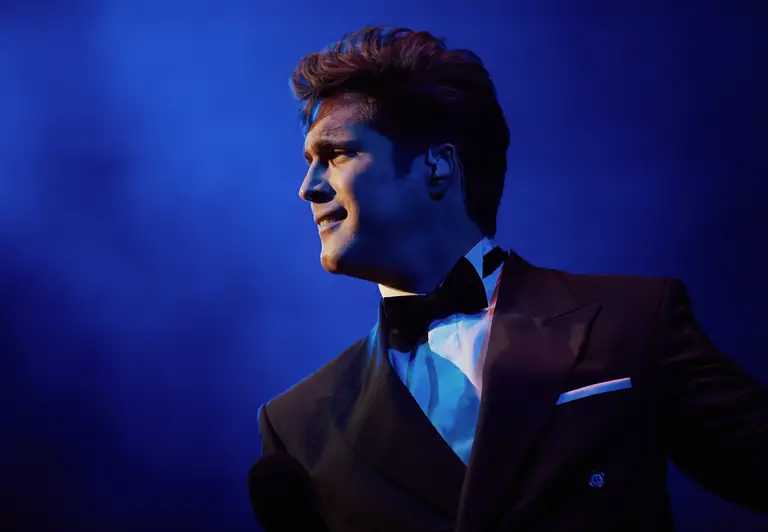“At what point did I become this”, the singer asks himself in this final cycle of the biographical series that put together the puzzle of his life, after 40 years without really knowing who he was despite his omnipresence in the Latin songbook. A star without competition, an amazingly talented guy, singular and unbearable, in equal parts.
READ ALSO: The lawsuit between Luis Miguel and Alejandro Asensi, what happened in reality?
Luis Miguel looks like Jake LaMotta outside the ring in Toro Salvaje (1980) . Paunchy, bloated, a smoking cigar on the lips and a half-served whiskey glass, like an extension of a chubby body. The look is a gap between boredom and confusion, which he tries to disguise with a forced smile.
“At what point did I become this”, he asks himself in this final cycle of the biographical series that put together the puzzle of his life , after 40 years without really knowing who he was despite his omnipresence in the Latin songbook. A star without competition, an amazingly talented guy, singular and unbearable, in equal parts.
After the shock of the first season that made us feel sorry for his unfortunate childhood under the exploitation of his father, followed by a second cycle less fortunate in the absence of the parent villain, this last part introduces us to the abyss of his loneliness and decadence emerging a meta-story, turned into something like a key to salvation: Luis Miguel is offered the Luis Miguel series, and he meets the actor Diego Boneta.
READ ALSO: The mismanagement of Luis Miguel’s managers
Faced with the offer, the unshakable policy of keeping his private life out of the reach of the media, collapses like the wall that separated Berlin. If you want to sanitize your accounts and solve legal problems, you must sell your biography to be dramatized on screen. The portrait, you know, contains too many grays in a figure like hers, identified with the sun by Latin pop culture.
Thus, Luis Miguel must expose his existence to maintain the prerogatives of his wealthy life, threatened by financial mismanagement. He must reveal who he is to remain king.
Luis Miguel blends in with Elvis, his maximum reference, as he approaches his fifties. The suits hardly fit, thick sideburns finish off a hairstyle similar to a helmet with opaque finishes. He still sings like the gods when he wants to, but he also performs erratically on stage, as happened in the last years of the king of rock on second-rate circuits, with an audience perplexed by his decline. In a sad parallel, the series portrays that until recently the Mexican fought in similar redoubts with seedy dressing rooms, and the audience booing his obvious drunkenness on stage.
The series never verbalizes it, it would be redundant, but this cycle highlights Luis Miguel’s alcoholism.
“You always sing the same songs in the same places, you will get stuck if you don’t risk it,” Mariah Carey prophesies.
The pop star not only represents the great love of this season that, like the previous ones, shuffles two times where Luis Miguel makes the same cards and the same bad decisions, but through his interference it is explained why the Mexican never made the crossover. towards the US market.
The dramatization moves pieces and takes licenses typical of the genre, dating Luis Miguel’s relationship with the renowned producer David Foster, the key to entering the Anglo market, at the end of the 90s when, strictly speaking, the joint work dates from the album Aries ( 1993).
Manager Patricio Robles, played phenomenally by Pablo Cruz Guerrero -a classic Mexican villain-, is a fictional character that summarizes different representatives that Luis Miguel had. Patricio embodies a harsh reality in the world of entertainment, which in the case of music has lavished a gallery of underworld characters, vultures in suits and ties ready to shear their clients.
But the series does not let it escape that the star’s permanent loneliness cannot be endorsed by third parties. Luis Miguel never finds love, as he has the dubious talent of alienating those closest to him.
The artist who has made an unparalleled career singing to love, does not know how to love.
Diego Boneta has outstandingly portrayed a central figure in Latino pop culture from the ages of 17 to 50. The Mexican actor and singer, who was already recognized and reputed, will be marked for his entire life by this role. He was transfigured into the star and it is difficult to dissociate his figure from the idol. His versions of the classics of Luis Miguel’s repertoire are unappealable, as his work in this last season successfully composes the portrait of a man who does not learn from his past, inexorably losing the light that he radiated, immersed in alcohol and loneliness.
There is no glamor in the Luis Miguel of the last decade , crammed into a Beverly Hills house with a narrow and dirty pool, an oversized luxury car in the garage, and many empty glasses as proof of the need to drown in drink, the only faithful company of the Sun of Mexico in all its existence.

